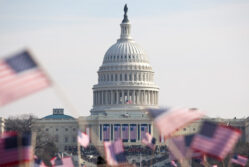Event Coverage Highlight

Panel 3: President Xi’s Effort to Remake Chinese Society

Left to right: Andrew Nathan, Wu’er Kaixi,Sheryl WuDunn, Jerome Cohen and Teng Biao. Photo: Chad Bouchard
The third panel discussion of the day was moderated by author Sheryl WuDunn, who won a Pulitzer prize and an OPC Award for her coverage of China. The spotlight focused on Chinese president Xi Jinping and on the vast, perhaps outsized, effect that one man can have on the billion-member society that he governs.
The panelists analyzed both the man and his methodology: what he does, how and why he does it, and the ways in which Jinping’s policies have departed from previous leaders.
Columbia professor Andrew Nathan described the overarching goals of Xi’s policies: “Imposing control over society, including those who are not with the program.”
This is nothing new, said Wu’er Kaixi, who survived Tiananmen Square. “That’s how Chinese governments have been ruling China: with fear.”
Those who comply are offered social and economic advancement. “I call it ‘the lousy deal,’” he said. “Economic freedom in exchange for political freedom.”
But even there, the government maintains a certain balance. “You cannot let go of the economy because that will empower actors who are stronger than you,” said Andrew Nathan about the government’s stance.
While that’s been the case many decades, one critical change for the new guard, said Wu’er Kaixi, is that “Xi Jinping wants to export his ideas to the world. That’s different than his predecessors.” That includes political crackdowns, censorship of the press and Internet, and the controversial social credit system that is currently under development.
Is it the world’s responsibility to act? Both Wu’er Kaixi and Teng Biao are strong advocates for intervention, with the latter taking a particularly strong stance on the issue: “Chinese communism is not just a threat to Chinese people, but to the whole world. It is maybe the most important thing that all countries, all people on this planet, are facing.”
For governments and entities who decide to intervene, Jerome Cohen, a professor at NYU Law, offered an observation: “They don’t respond to world criticism, but they do respond to world pressure. What the Japanese call gaiatsu, world pressure, is important in China.”


